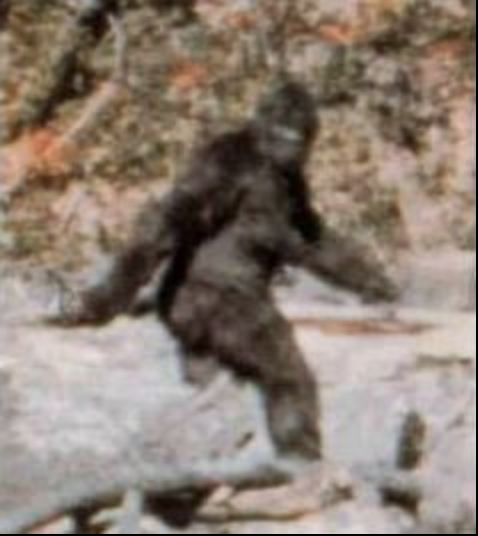CRYPTO(zoology)
Where are all the bigfeet?
Mike Sherov
VP of Making Hoax Videos in the Canadian Wilderness
Overview
- What is cryptozoology?
- What is pseudoscience?
- On being a devil's advocate
- Believing in Bigfoot
- Lack of Evidence??!?
- Falsifiability
- Truth
- Visions of Bigfoot
What is cryptozoology?
A pseudoscience that aims to prove the existence of entities from the folklore record, such as Bigfoot or chupacabras, as well as animals otherwise considered extinct, such as non-avian dinosaurs. Cryptozoologists refer to these entities as cryptids.
- An unverified claim
from Wikipedia
What are cryptids?
- Distribution anomalies (alligators in the sewer)
- Unusual, or outsized variations of known species (Giant Squid)
- Survivals of extinct species (Tasmanian Tiger)
- Not known from fossils but related to known species (Andean Wolf)
- Not known to be related to any known species (Bigfoot, Nessy)
- Mythical animals with a zoological basis (Griffins)
- Seemingly paranormal or supernatural entities with some animal-like characteristics (Vampires, Fairies, Werewolves)
What aren't cryptids?
- Insignificance
- Lack of Controversy
- Erratics
- Bizarre Humans
- Angels and Demons
- Aliens, sadly
What is Pseudoscience?
Pseudoscience consists of statements, beliefs, or practices that are claimed to be both scientific and factual, but are incompatible with the scientific method
- An unverified claim
from Wikipedia
What is Pseudoscience?
- Lack of systematic practices
- Lack of evaluation by others
- Confirmation Bias
- Unfalsifiable Claims
Lack of Systematic Practices

Confirmation Bias
- Researchers are invested in a particular outcome.
- They misremember observations; see non-existent patterns!
- They dig in against opposing information (backfire effect)
Lack of Eval By Other Experts
- A hallmark of science is repeatability
- Refutations typically welcomed*
- Methodology picked apart rigorously
Types of Reasoning
- Inductive Reasoning: method of reasoning in which the premises are viewed as supplying strong evidence for the truth of the conclusion. The truth of the conclusion of an inductive argument may be probable, based upon the evidence given.
- Deductive Reasoning: the process of reasoning from one or more statements (premises) to reach a logically certain conclusion.
- Abductive reasoning: form of logical inference which starts with an observation then seeks to find the simplest and most likely explanation: Occam's razor.
Unfalsifiable Claims
A theory in the empirical sciences can never be proven, but it can be falsified, meaning that it can and should be scrutinized by decisive experiments
- Karl Popper, father of empirical falsification
Unfalsifiable Claims
- "There are no vulnerabilities in this software" can be deductively proven false. Therefore it is testable.
- "There is a vulnerability in this software" can not be deductively proven false. Therefore, it is untestable.
- The key difference is in whether or not a claim can be proven false, not true.
Unfalsifiable Claims
- All we are trying to do is get better theories! Hypotheses allow us to deduce when we are wrong, so that we can confidently induce theories when we are right!
- If we hypothesize "all swans are white" and discover a black swan is a muddy bog in Loiusiana, We may then abductively hypothesize "all swans in clear water are white" (instead of "all swans are white except in Loiusiana") .
- If we hypothesize "at least one swan is black" and we don't discover a black swan, the true believer will be left with their original hypothesis, neither inductively bolstered, nor deductively forced to be improved and refined.
Believing in Bigfoot

Bigfoot - on lack of evidence
- Is there really no evidence?
- What is you first reaction when seeing a video?
Bigfoot - on lack of evidence
Like this Coelacanth, Lazarus Taxon exist

Bigfoot - on lack of evidence
Like this Saola discovered in 1992, former cryptids exist

Bigfoot - on lack of evidence
Just how big and empty is the canadian wilderness?


Bigfoot - on lack of evidence
- How many people are actually looking for Bigfoot?
- Are these people trained or skilled?
- Do they have resources and funding?
Bigfoot - on lack of evidence
- Why are there no dead bigfeet?
- Have you ever seen a Panda carcass?
Bigfoot - on falsifiability
Karl Popper himself strictly opposed the view that non-falsifiable statements are meaningless or otherwise inherently bad, and noted that falsificationism does not imply it.*
*According to a footnote on Wikipedia that I didn't verify.
Bigfoot - on truth
The search for Bigfoot is inherently the search for truth. But what does it mean for something to be true? Is it sufficient for something to be 99.9% certain? Is that different from 99.999%?
This is the "Problem of Induction"
Visions of Bigfoot
Sometimes in the quiet of a foggy night, I peer out into my backyard and imagine a giant beast silently stalking me. There's probably nothing there.
Comments?
Questions?
CRYPTO(zoology)
By mikesherov
CRYPTO(zoology)
- 1,872



